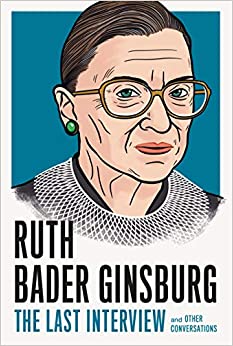Books |
Ruth Bader Ginsburg: The Last Interview, and Other Conversations
By
Published: Jan 13, 2021
Category:
History
Her father came to America from Russia when he was 13. He went to night school to learn English. He never had any formal education except Hebrew school in any country. Her mother died the day before she graduated from high school. Her husband got sick, and she juggled motherhood, law school, and his law courses. And she became a legend: the most beloved justice on the Supreme Court.
There are two good movies about Ruth Bader Ginsburg. Of the two, I prefer the drama, “On the Basis of Sex,” starring Felicity Jones. [To watch the trailer, click here. To watch the last scene, with a surprise at the end that had audiences in theaters cheering, click here. To stream the movie on Amazon, click here.] The documentary is “RBG.” [To watch the trailer, click here. To stream it on Amazon, click here.]
And now there’s a book, “Ruth Bader Ginsburg: The Last Interview: and Other Conversations.” Seven interviews, spanning her career. Some about the law, some personal. 208 pages. Fans of RBG — especially young women, law students, and young lawyers — will happily mark the pages. [To buy the paperback, click here. For the Kindle edition, click here.]
The book starts in 1972, when she was 38 and the Times is profiling her. She’s a professor at Columbia University — the first time Columbia has chosen a woman for a full-time post higher than lecturer. She immediately noticed the university was firing 25 women who were working as maids, but had fired no men. “I went to the university vice-president, and told him that the university was violating Title VII.” He replied: “Professor Ginsburg, Columbia has excellent Wall Street lawyers representing them and would you like a cup of tea?” So she took her own employers to court. Eventually, Columbia decided in the end to fire no one. RBG: “Faced with the necessity of having to drop about 10 men before they reached the first woman, they found a way to avoid laying off anyone.”
In another interview, she recalls how her son’s school never called her husband when there was a problem with their son. She suggested the school might sometimes call him. The principal’s office never called her again: “I suspect that the school was reluctant to take a man away from his work — it wouldn’t hesitate to call a mother away from hers –anyway, there was no quick change in my son’s behavior, but the calls came barely once a semester. And the reason was they had to think long and hard before asking a man to take time out of his work day to come to the school.”
Some excerpts:
With Nina Totenberg, at the Sundance Film Festival
About the #MeToo movement: “It’s about time. For so long women were silent, thinking there was nothing you could do about it, but now the law is on the side of women, or men, who encounter harassment and that’s a good thing.”
About her own experience with sexual harassment: “Every woman of my vintage knows what sexual harassment is, although we didn’t have a name for it.” At Cornell, she once needed help in chemistry. The instructor gave her a practice exam. It turned out to be the same as the real exam. “I knew exactly what he wanted in return. I went to his office and said, ‘How dare you? How dare you do this?’ And that was the end of that.”
With Bill Moyers
Moyers: Is it true your husband influenced your using the phrase “gender discrimination” instead of “sex discrimination?”
RBG: That change was brought about by my secretary at Columbia Law School.. She said to me one day, “I’ve been typing these briefs for you and the word sex juts out all over. Don’t you know that the men you are addressing… that their first association with the word sex is not what you want to be on their minds. So choose a gender-neutral word, a grammar book term, and that will ward off distracting associations.” So I thought that she was so right, and I began to use ‘gender-based discrimination. And the court picked it up..
Moyers: What should citizens do when they see injustice being perpetrated?
RBG: My faith is in today’s young people. I’ve seen it in my granddaughter and the things that she is doing. In my former law clerks. One of my former law clerks is devoted to seeing to it that every child who turns 18 registers to vote. My granddaughter is involved with the Purple Campaign, which is concerned with the sexual harassment in the workplace. I think there is a spirit among today’s young people that wants to combat injustice. That’s what I believe, and I would do everything I could to encourage that.


